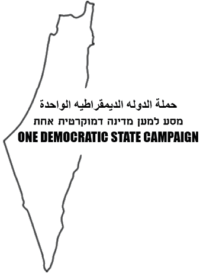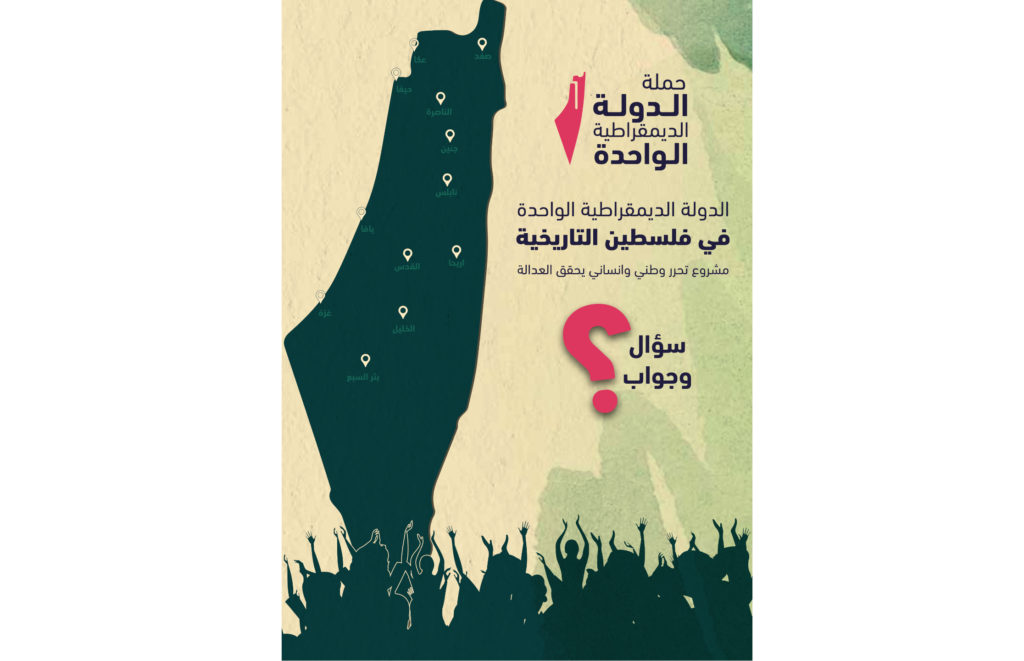What is the one-state solution’s ultimate aim?
To decolonize Historical Palestine from the ‘River to the Sea’ by establishing a democratic state
What is the One Democratic State Campaign (ODSC)?
The ODSC is a Palestinian-led initiative that intentionally refrains from prescribing the exact form and structure of a future Palestinian state, viewing this as the exclusive prerogative of the Palestinian liberation movement. Instead, it outlines broad principles that have been introduced and refined by activists and scholars over the years, aiming to support the eventual establishment of the state.
What is the ODSC’s political programme?
Political principles
- Decolonisation. The dismantling of Zionist structures of control and domination
- Constitutional Democracy. A political regime will be established in Historical Palestine in which all inhabitants, including Palestinian refugees, have equal rights and a shared entitlement to freedom and security.
Key rights and entitlements
- Collective Rights. The State constitution also protects collective (national, ethnic, religious, class, or gender-related) rights.
- Economic Justice. The State will commit to achieving and upholding economic and social justice, thereby ensuring that all citizens have an equal opportunity to access education and attain productive employment, economic security, and a dignified standard of living.
- Individual Rights. No State law, institution or practices will discriminate, whether based on national or social origin, color, gender, language, religion or political opinion, and/or sexual orientation.
- Return, restoration, and reintegration into society. The State will implement the Right of Return of all Palestinian refugees expelled in 1948 and after. It will help refugees to return to their original homes when possible, or as near as possible when this cannot be achieved. It will do everything in its power to restore private and communal property to refugees and/or compensate them
Regional and International Relations
- Alignment with progressive regional political actors. The Campaign will align with all political forces in the Arab world struggling for democracy, social justice, and egalitarian societies free from tyranny and foreign domination.
- International responsibility. The Campaign sees itself as part of a progressive movement committed to fighting racism, imperialism, and colonialism and establishing an alternative global order that is just, egalitarian, and free of oppression.
Do Palestinians need a Programme at all?
Palestinians can only define their liberation goals through a workable political programme.
Why is it not enough to implement Palestinian rights under International Law?
Human rights and international law are not, and cannot substitute for, a political programme. Currently, open questions about the precise nature of decolonization, the return of the refugees, and the new state’s constitution/major policies can only be answered by Palestinians themselves, specifically by articulating and developing a political programme.
The two-state solution is acceptable to the national leadership and has been accepted by the international community. Why abandon it now?
Even the ‘best’ version of the ‘solution’, conceivable in June 1967, only offered a semi-sovereign ‘state’ on just over one-fifth (22 percent) of Historical Palestine, which would be at Israel’s mercy and disconnected from the Gaza Strip. Subsequent Israeli settlement expansion in the West Bank has shrunk this total still further to 16–18 percent of the territory. If the two-state ‘solution’ persists, Israel will continue to destroy Palestine and the Palestinians with effective international immunity, and the different forms of oppression that afflict Palestinian refugees and the ‘48 Arabs will remain unaddressed.
Why not seek a confederation of two states or a binational state?
Both are simply variations of the two-state solution and violate the most important principles of the Palestinian struggle. Rather than decolonizing Palestine by dismantling colonial structures of domination and control, they leave Zionist Israel intact.
What is the future of the West Bank and Jerusalem settlements?
They are illegal and violate basic Palestinian human and national rights. Their precise fate will be decided by the ‘67’ refugees and the current inhabitants of the occupied West Bank.
Zionists will never agree to a one-state solution, so why bother proposing it?
South Africa is one of the few cases where the colonizer has voluntarily relinquished colonized land. While we should not expect the Zionists to agree to dismantle the colonial state, nor should we make their consent a precondition or prerequisite. Our task is straightforward: to collapse Israel’s apartheid regime and force Israelis to accept a transition to a democratic state. For this, we do not need their agreement or permission and will work to mobilize and achieve a just solution for all. Furthermore, as international organizations such as the International Court of Justice (ICJ) and other international bodies increasingly recognize Israel as an apartheid state, UN conventions that require, and indeed demand, a transition to democracy will apply to Israel.
Israel is a legitimate state in the eyes of the international community, a member of the UN. The proposed one-state is not even legal under international law.
The UN General Assembly (UNGA) that recognized Israel as a nation-state did not represent the colonized world. On November 10, 1975, a UNGAR, passed by a body that included colonized countries, condemned Zionism as a form of racism.
Is it possible for Palestinians to achieve real equality within a single state?
Concerns about this are exacerbated by the (mis)representation of the level of Palestinian (economic and social) development in Israel and many Arab countries. Transitional justice, a constitutional measure that will (re)address and correct existing inequalities, will also promote equality. Through the liberation process, future equality will replace past inequality.
What are the next concrete steps?
- Locating the discussion of the decolonization of Palestine at the center of an intra-Palestinian public discourse
- Overcoming Palestinian fragmentation and disunity
- Building a consensual vision that will inform the liberation movement’s strategy and contribute to the building of broader solidarity/ies
How will the ODSC contribute to these steps?
The Campaign believes in building a tripartite alliance that will unite the Palestinian liberation movement, anti-Zionist Jews, and the international solidarity community to assist the struggle for decolonization and liberation. A consensual vision and programme are prerequisites for this.
Each of the alliance parties can work independently and in cooperation with others, with the ODSC helping to coordinate strategic actions: those struggling in the West Bank will be able to
specify what they need from the international community to work towards the single state and achieve decolonization. Meanwhile, in working within Israel, the Campaign will work to build a political anti-Zionist Arab–Jewish alliance. Palestinians across Historical Palestine and in exile, most notably refugees, will coordinate strategic actions that work towards constructing the State and decolonization.

